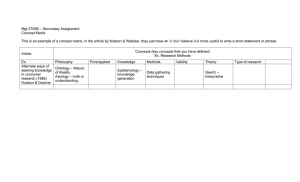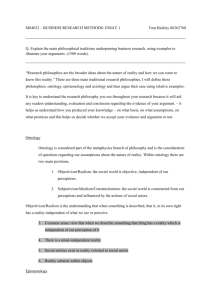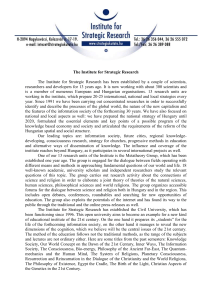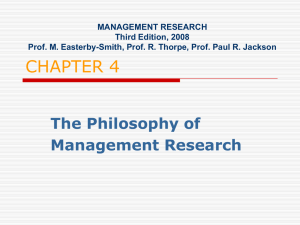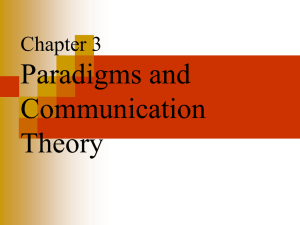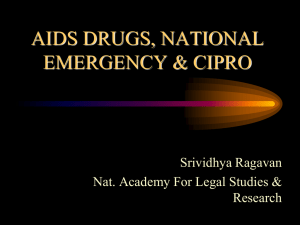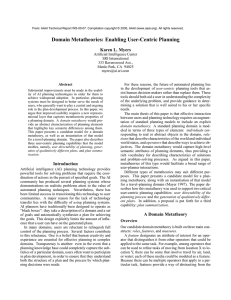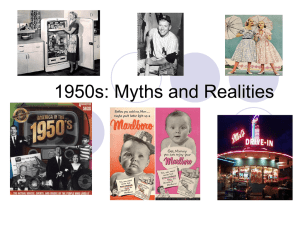theory and metatheory - Interpersonal Communication
advertisement
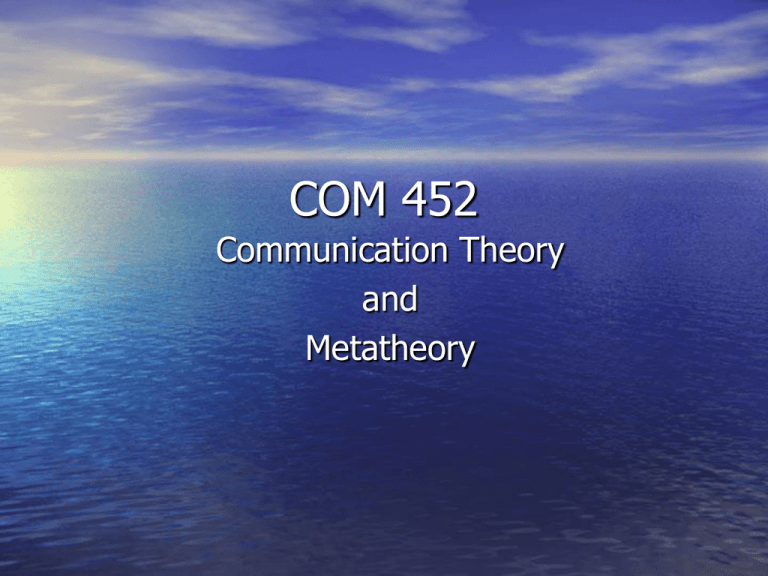
COM 452 Communication Theory and Metatheory What is theory? • A system of generalizable statements logically • • • linked together to explain, describe, predict, and/or control human phenomena in a given context A descriptive generalization about a phenomenon An explanation of how or why something occurs An attempt to predict what will happen and possibly control outcome What is Metatheory? • Metatheory is “theory about theory” • It addresses three assumptions: – The nature of knowledge (epistemology) – The nature of being/existence (ontology) – The nature of values (axiology) Epistemology: How do we know what we know? • Is there “one reality” waiting to be discovered • • • through our senses? Can different researchers study the same thing in the same way and build a body of knowledge? Or are there multiple subjective realities, each one equally valid? NOTE: Just because there can be multiple interpretations of a phenomenon does not mean there are multiple realities/existences of the phenomenon Ontology: Why do we do what we do? • Do biology and environment interact to influence human behavior? • Does this happen outside human awareness? • Do humans behave according to their volition, their intention? • As human choice/free will goes up, predictability goes down Axiology: What is the role of values in our research? • Do we value scholarship that stresses objective • • • knowledge to explain, predict and possibly influence human behavior? Is our research value-neutral? Do we value scholarship that stresses subjective understanding to describe the human condition and liberate people from oppression? Do our values influence our research? Two Major Perspectives • Scientific/Objectivist – One Truth (objective) – Behavior is relatively determined – Values do not influence research (i.e., value neutral) • Interpretive – Multiple realities (subjective) – Humans have free will – Values do influence research Where do you stand? • Epistemology? – Is there an objective reality to be discovered or are there multiple realities to be created? • Ontology? – Does your biology/environment influence you or are you free to behave as you please? • Axiology? – Can you remain objective or will your values influence what you research, how you do research and what you find? Why care about metatheory? • Each theory will have associated metatheoretical • perspective and assumptions (E, O, V) These assumptions tell you a lot about the theory – Does the theory assume one reality or multiple realities? – Does the theory assume behavior is determined or at the will of the individual? – Does the theory assume that research is value neutral or that the values of the researcher are influential? • Given the metatheoretical perspective, does it make sense to ask the questions that are being asked and look for answers with the methods being used? Research Methods • Experiments: discover cause and effect • • • relationships by manipulating IV in a controlled situation to discover its impact on DV Surveys: collect self-report data to discover people’s attitudes, intentions, behavior Textual Analysis: describe and interpret the characteristics of messages Ethnography: develop understanding of people’s culture (shared meanings, values) through observation Substance Use • Experiment: Does a high sensation value PSA • • • lead to greater attitude change? Survey: Does TV viewing differ between substance users and non-users? Textual Analysis: What does Nancy Reagan’s “Just Say No” speech reveal about White House policy? Ethnography: Within the community of heroin addicts, how are interpersonal relationships established and maintained? (Meta)Theory/Method Interface • Metatheory tells you how you see the world • Theory tells you what you are looking for • Method tells you how to find it • (Meta)Theory and Method need to cohere, but each perspective/approach can inform the same problem
